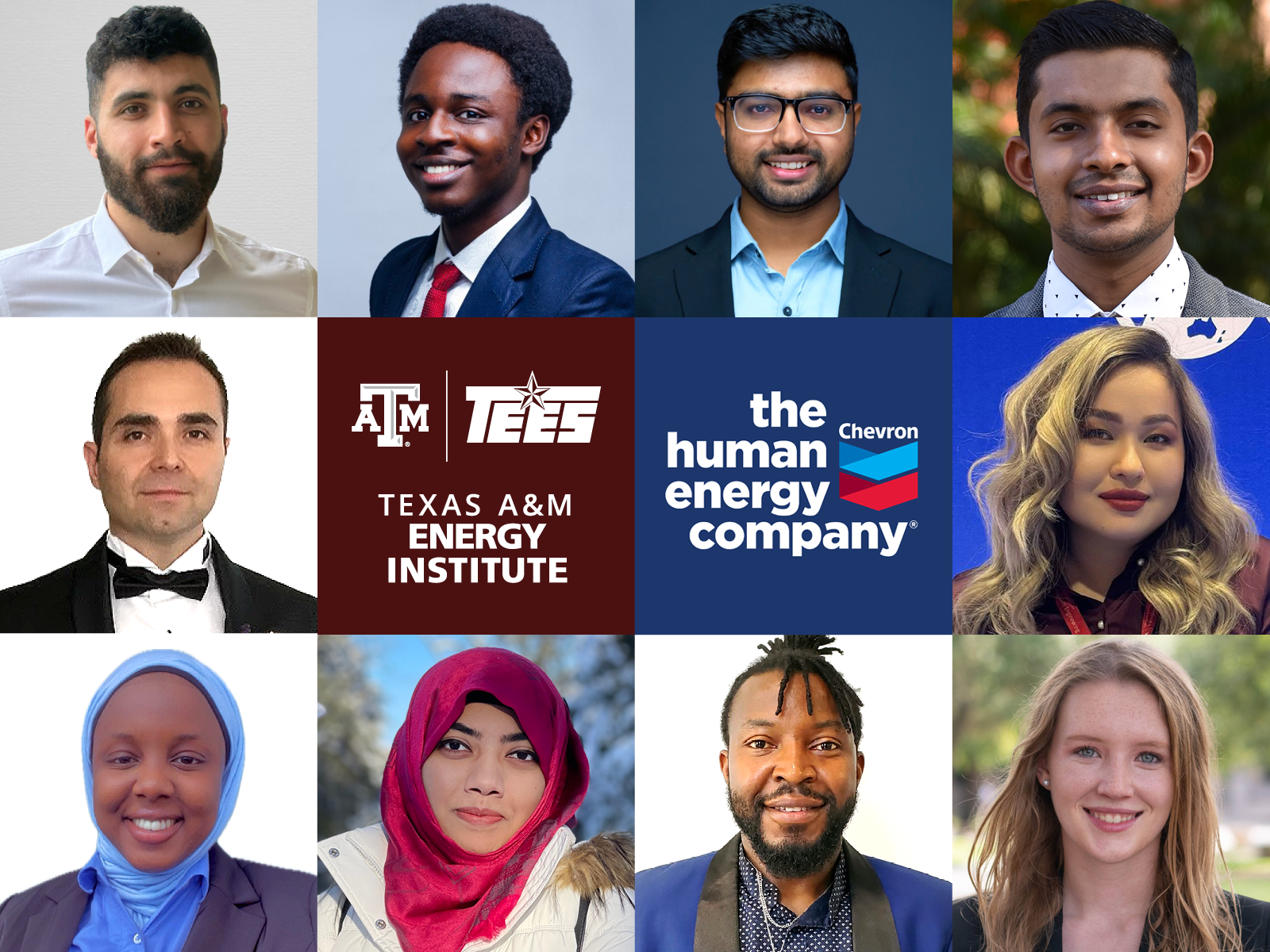
The Texas A&M Energy Institute, in partnership with Chevron, is pleased to announce the selection of 10 Texas A&M Chevron Energy Graduate Fellows for the 2025-2026 academic year.
Funded by Chevron, the program recognizes outstanding graduate student researchers from across the Texas A&M campus annually with fellowship awards and includes mentoring from faculty experts and opportunities to meet with subject matter experts at Chevron. The Texas A&M Chevron Energy Graduate Fellows program is part of Chevron’s University Partnership Program, which supports universities around the country by providing the necessary funding to better develop the future of the energy business.
“This exciting new collaboration between Texas A&M and Chevron represents a significant step forward in our shared commitment to advance energy solutions in support of a lower carbon energy future. Our newest Chevron Fellows are poised to make a real impact by creating scalable solutions that will transform the energy landscape. We eagerly anticipate the positive contributions they will make for the world,” said Jim Gable, the Vice President of Innovation at Chevron’s Technical Center and President of Chevron Technology Ventures.
Fellows will have the opportunity to engage periodically with Chevron subject matter experts and participate in educational and research engagements organized by the Texas A&M Energy Institute throughout the year.
2025-2026 Texas A&M Chevron Energy Graduate Fellows
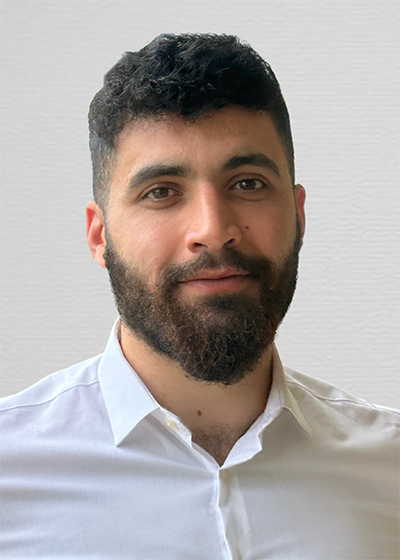
Kassem Alokla
Major: Petroleum Engineering
Advisor: Thomas Blasingame
Multi-Physics Simulation of CO₂ Injection in Depleted Gas Reservoirs: Geomechanical and Geochemical Interactions for Enhanced Storage Security
Kassem’s research focuses on advancing large-scale geological carbon storage through fully coupled thermo-hydro-mechanical-chemical (THMC) modeling. He develops integrated workflows to characterize pressure-saturation plume dynamics, caprock integrity, trapping mechanisms, geochemical alterations in the near-wellbore region and fracture and fault activation. His work supports critical components of safe and scalable CCS deployment, including the delineation of the Area of Review, pressure management through brine production, and regulatory compliance with EPA Class VI permitting. He also explores the use of machine learning techniques to accelerate scenario evaluation and optimize CO₂ injection strategies in saline aquifers.
Kassem Alokla is a Ph.D. candidate in Petroleum Engineering at Texas A&M University, working under the supervision of Professors John Lee, George Moridis, and Thomas Blasingame. His research focuses on large-scale CO₂ injection and storage subsurface simulation through fully coupled models. Kassem has completed multiple internships, including two with Chevron, and integrates field-driven insights into his academic work. He has demonstrated strong leadership as a two-term Society of Petroleum Engineers Student Chapter President and founding Chair of the Texas A&M CCS Symposium. He is a recipient of multiple awards and scholarships, including the SPE Presidential Award for Outstanding Student Chapter and second place winner of the 2024 National Academy of Engineering Regional Conference competition.

Adeshina Badejo
Major: Petroleum Engineering
Advisor: Rita Okoroafor
Optimizing CO2 Storage Efficiency with Digital Twin Modeling: A Scalable Approach for Decarbonization
To ensure CO2 storage integrity, regulatory compliance, and long-term environmental sustainability, measurement, monitoring, and verification (MMV), are essential to CO2 sequestration. The ability to predict a storage integrity issue before it occurs would be valuable in supporting CO2 storage site owners in making decisions that can minimize the detrimental effects of loss in storage integrity. While several MMV technologies exist, there is a gap in predictive tools that can utilize real-time surface measurements to anticipate subsurface issues before they occur. Thus, my research focuses on developing a High-Performance Digital Twin Technology for CO2 MMV that combines a proxy model (based on a physics-informed numerical simulation model) that accounts for the thermohydrochemomechanical processes that occur during CO2 storage with a deep learning framework that has identified patterns leading to CO2 storage integrity issues based on surface data, such as temperature and pressure. By combining real-time subsurface data with AI-driven models, I aim to improve the accuracy of storage integrity predictions and reduce risks. This approach helps ensure that carbon capture and storage (CCS) projects are both reliable and scalable for long-term low-carbon energy solutions.
Adeshina Badejo is a Ph.D. student in Petroleum Engineering at Texas A&M University, working within the Subsurface Engineering for Sustainable Energy (SESE) research group under the supervision of Dr. Rita Okoroafor. His research year-to-date focuses on understanding the combined geomechanical and geochemical effects of CO2 storage at the field scale. He integrates numerical modeling and machine learning techniques to advance this work.
Passionate about mitigating the environmental impact due to anthropogenic greenhouse gas emissions, Adeshina actively contributes to efforts in sustainable energy initiatives. His recent selection as one of 32 emerging leaders from 14 universities in the 2025 OpenMinds NextGen program reflects his commitment. Through the program, he will collaborate with industry experts to tackle the Dual Challenge: more energy, less emissions, and faster.
An active member of the Society of Petroleum Engineers (SPE) since 2016, Adeshina has held several volunteer roles and currently serves on the Editorial Board of The Way Ahead, an SPE publication. He recently led the Texas A&M SPE PetroBowl team to the North America qualifiers, where they secured one of five spots to represent the continent at the 2025 PetroBowl Championship.
Adeshina holds a master’s degree in Subsurface Energy Systems from Heriot-Watt University, Edinburgh, where he received the 2023 SPE Aberdeen Section Bursary Award. He also earned a bachelor’s degree in Petroleum and Gas Engineering from the University of Lagos, Nigeria.

Digvijaysinh Barad
Major: Mechanical Engineering
Advisor: Bryan Rasmussen
Novel tools and methods for smart assessment of industrial energy systems to foster energy efficiency
This research focuses on advancing industrial energy efficiency as a key strategy for decarbonization, with a particular emphasis on optimizing compressed air systems in manufacturing. Despite their ubiquity and significant energy consumption—accounting for up to 10% of U.S. manufacturing electricity use—compressed air systems are often inefficient and poorly monitored. The work leverages Industry 4.0 technologies to implement a “3M” (Measure, Monitor, Manage) approach, developing smart assessment tools, user-friendly prescriptive diagnostics, and data-driven models to detect inefficiencies such as air leaks and artificial demand. Contributions include the development of a smart data logger, an automatic air leak measurement device, experimental evaluation of engineered air nozzles, and the creation of indirect flow monitoring methods using statistical analysis of power and pressure data. Future research will enable waste heat recovery from air compressors and integrate machine learning for more robust diagnostics. The overarching goal is to make energy assessment more accessible and actionable, supporting measurable progress toward industrial decarbonization and sustainability.
Digvijaysinh is a second-year doctoral student in Mechanical Engineering at Texas A&M University, College Station. He began his academic journey at Texas A&M in Fall 2021 as a master’s student. Upon completing his Master of Science, he chose to continue his studies at the doctoral level, motivated by a deep curiosity and a commitment to advancing knowledge for the betterment of society.
Originally from India, Digvijaysinh was raised in a family of four. He holds a Bachelor of Technology in Mechanical Engineering from the Indian Institute of Technology (IIT) Dhanbad, and a Master of Science (thesis track – thermal engineering) in Mechanical Engineering from Texas A&M University, College Station. His current research looks at the development of new tools and resources to foster energy efficiency in industrial settings.
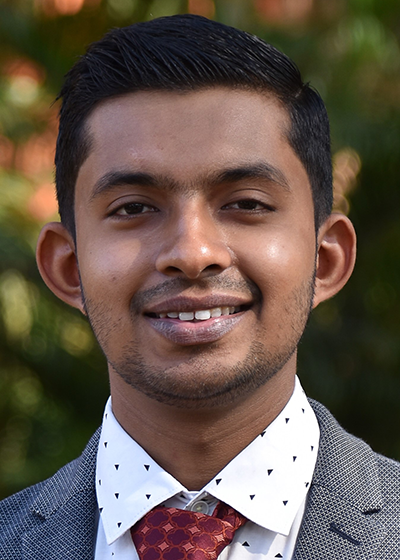
Siddhesh Shirish Borkar
Major: Chemical Engineering
Advisor: Manish Shetty
Decarbonization through the H2-free Upcycling of Waste Plastics into Sustainable Fuels using Tandem Catalysis
Utilizing renewable energy and lowering our carbon footprint are the cornerstones of sustainable development. Single-use plastics, while versatile and affordable, have a significant carbon footprint and negatively impact our environment when improperly disposed of. My research is focused on heterogeneous catalysis to upcycle post-consumer plastic waste into higher-value compounds, including sustainable aviation fuel components, oils, and platform chemicals. My research utilizes the chemistries of hydrogenolysis and solvolysis to depolymerize prominent post-consumer plastics, including polyethylene, polyethylene terephthalate, and polycarbonate. In addition to creating a circular carbon economy through catalytically upcycling plastics, I utilize liquid organic hydrogen carriers in place of gas-phase hydrogen to facilitate these reactions, thereby creating a hydrogen value chain that utilizes biomass-derived alcohols as hydrogen sources. I use experimental and computational techniques to probe the active site requirements and reaction mechanisms for these reactions. Through this research, I aim to elucidate the key reaction mechanisms and catalyst design principles for efficiently upcycling large volumes of mixed plastic waste and contributing to sustainable fuel production pathways.
Siddhesh hails from Mumbai, India, and completed his undergraduate studies in chemical engineering at the National Institute of Technology Rourkela, India, in 2020. He joined Texas A&M University in the Fall of 2021 to pursue his master’s degree in chemical engineering and graduated in May 2023 under the guidance of Prof. Manish Shetty. He then transitioned into the Ph.D. program under the guidance of Prof. Shetty and is working on the catalytic upcycling of waste plastics. His primary research interests are catalysis for sustainable energy applications and environmental mitigation. Beyond his research and academic work, he enjoys traveling, and his hobbies are cooking, running, and soccer.
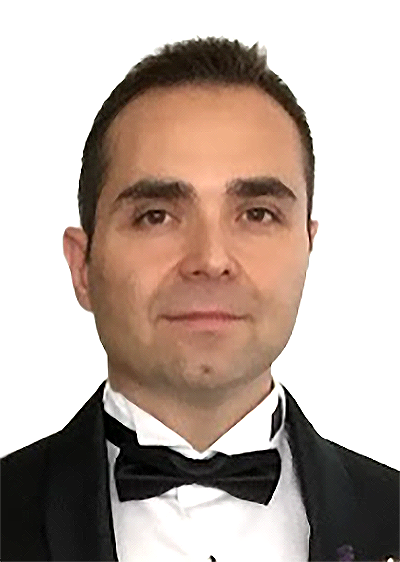
Halil Iseri
Major: Interdisciplinary Engineering
Advisors: Stratos Pistikopoulos and Eleftherios Iakovou
Design and operation of resilient and environmentally conscious energy systems and supply chains under uncertainty through mathematical modelling and optimization
Halil Iseri’s research focuses on the design and operation of resilient and environmentally conscious energy systems and supply chains under uncertainty through mathematical modelling and optimization.
Mr. Iseri began his research by addressing the growing need to transport renewable energy and hydrogen from resource-rich regions to industrial demand centers. To this end, he developed a multi-objective optimization framework that incorporates cost, environmental impact, and transportation risk objectives, and considers multiple production locations, energy carriers, and transportation modes to determine the optimal energy transportation strategy. His findings reveal that optimal energy transportation strategies depend on distance, energy demand, and the potential to repurpose existing infrastructure. He is currently extending this framework into a “Data-Driven Design and Operation of Resilient Renewable Energy Supply Chain Networks Under Uncertainty” model, which leverages resilience metrics and machine learning for adaptive planning and operations.
Mr. Iseri is also engaged in collaborative research on the integration of renewable energy with energy-intensive material supply chains, such as steel and ammonia, using the spatial-temporal variability of renewable energy to investigate cost-emission trade-offs and long-term grid balancing. Additionally, through the NSF-funded SOLAR project, he develops mathematical models for reverse logistics network design for PV recycling, adopting a circular economy approach to enhance the resilience of critical material supply chains, including silicon, silver, and aluminum.
Halil Iseri is a graduate research assistant at the Texas A&M Energy Institute. He has worked several years in the oil & gas sector as an engineer and a mid-level manager. Throughout his career, he has worked with and led teams in numerous multi-disciplinary, multi-national, large scale energy investment projects. These team efforts received multiple accolades, including energy efficiency awards from the Turkish Ministry of Energy and Natural Resources. Driven by intellectual curiosity, his path led back to academia. During this period, Mr. Iseri also acted as a pilot cadet in the Turkish national flag carrier. Mr. Iseri has a M.Sc. degree in Mechatronics Engineering from Bogazici University, an Executive MBA from Koc University, and a Master in Energy Management from Technical University of Berlin. He has obtained his B.Sc. in Mechanical Engineering from METU. Earlier in his academic journey, Mr. Iseri received multiple distinctions, including formal recognition by the Turkish Ministry of Education for his role in the mathematics team, which achieved second place in the European Council of International Schools competition.

Leila Karabayanova
Major: Petroleum Engineering
Advisor: Berna Hascakir
In-situ combustion (High-Pressure Air Injection) for thermal enhanced oil recovery
This research transforms the traditional in-situ combustion process into a low-emission, high-efficiency recovery method for light oil shale reservoirs. While ISC has strong recovery potential, it typically generates significant CO₂ emissions. This project addresses that challenge by integrating experimental combustion studies with machine learning, mineral-based carbon capture, and CO₂ reinjection strategies. Analytical and numerical models are also developed to screen reservoir suitability and predict emission profiles. The outcome is a scalable, field-deployable framework that aligns enhanced oil recovery with sustainable carbon and thermal management, advancing cleaner energy solutions in unconventional resource development.
Leila Karabayanova is a PhD candidate in Petroleum Engineering at Texas A&M University. Her research focuses on advancing in-situ combustion (ISC) for light oil shale reservoirs by integrating carbon management, machine learning, and thermal recovery. With a background in experimental design and numerical modeling, she is dedicated to developing scalable, low-emission solutions for sustainable energy production in unconventional systems.
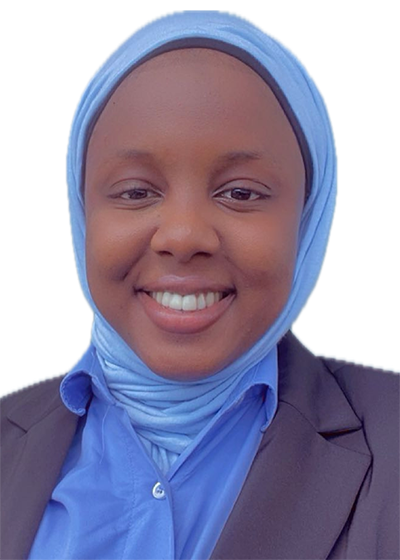
Ummu-kulthum Lawal
Major: Petroleum Engineering
Advisor: Kiseok Kim
Effect of serpentinization reaction on the poromechanical properties of olivine rock during hydrogen generation
Hydrogen is a viable option for future sustainable energy needs. Hydrogen can be sourced naturally from the subsurface reaction of olivine-rich rock formations with water under high-temperature and high-pressure conditions, in a process known as serpentinization. This reaction of olivine with water oxidizes the rock leading to a volumetric expansion of the rock while generating hydrogen. Even though this reaction has been described in the literature as a volume-expanding process, studies focus on generating more hydrogen while limited studies have studied the poromechanical response of these rocks due to the reaction. My research aims to experimentally optimize hydrogen generation from olivine rocks while also assessing the poromechanical response of these rocks during the hydrogen generation process. This includes assessing changes in rock stiffness, strength, and elasticity due to the volume expansion accompanying the serpentinization reaction. Understanding this coupling between geochemistry and geomechanics is important for the safe implementation of natural hydrogen generation projects. This study aligns with Chevron’s aim in new sustainable sources of materials for energy transition and research in future energy systems.
Ummu-kulthum is a Ph.D. student at the GeoEnergy Systems Laboratory in the Department of Petroleum Engineering at Texas A&M University. She holds a bachelor’s degree in petroleum engineering from Bayero University Kano, Nigeria, and a master’s degree in petroleum engineering from King Fahd University of Petroleum and Minerals, Saudi Arabia. Her previous research experience includes experimental and simulation studies on residual CO₂ trapping in geological formations. Ummu-kulthum now integrates geomechanics and geochemistry to experimentally investigate the coupled processes involved in hydrogen generation from olivine-rich rocks. She aspires to a career as an industrial researcher advancing low-carbon energy technologies.

Fatima Mahnaz
Major: Chemical Engineering
Advisor: Manish Shetty
Thermo-catalytic conversion of CO2 to value-added hydrocarbons (HC) by utilizing bifunctional metal-oxide/zeolite catalysts in a tandem reaction
My Ph.D. research focuses on converting carbon dioxide (CO2) and green hydrogen (H2) into sustainable fuels using bifunctional catalysts. Specifically, I work on tandem catalytic systems that pair metal oxides, which first convert CO2 into methanol, with zeolites, which then convert methanol into hydrocarbons like gasoline or aromatics — all in a single reactor. A key focus of my research is understanding how the spatial arrangement of these two catalyst components affects the reaction rates and product yields. I am also investigating how mass transport effects influence the reaction mechanisms and how to rationally integrate metal oxide and zeolite components for efficient CO2 conversion. My work is particularly relevant to the production of sustainable fuel alternatives for hard-to-electrify sectors like aviation fuels, a topic of considerable current research interest.
Fatima Mahnaz is a Ph.D. student in the Department of Chemical Engineering at Texas A&M University. She earned her B.Sc. in Chemical Engineering from the Bangladesh University of Engineering and Technology (BUET). Her research focuses on developing bifunctional catalysts for CO2 conversion to sustainable fuels and chemicals. In addition to her research, Fatima serves as a Graduate Teaching Consultant at the Center for Teaching Excellence, Texas A&M. Fatima plans to pursue an academic career and contribute to advancements in carbon-neutral fuel technologies and sustainable chemical processes.
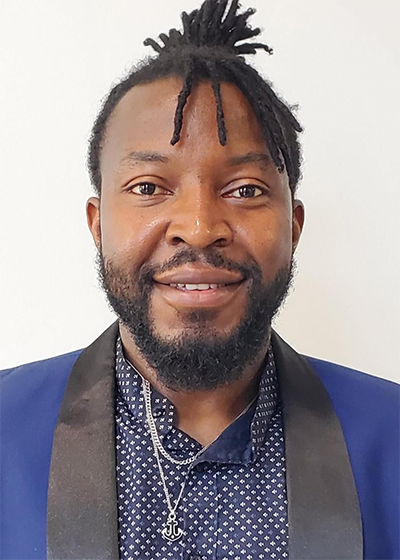
Zavier Ndum Ndum
Major: Nuclear Engineering
Advisor: Yang Liu
Transforming Nuclear Energy with AI and Digital Twin Technologies for Low-Carbon Solutions
The global energy sector is undergoing significant transformations as nations strive to address climate change and achieve net zero-emission goals. Nuclear energy, known for its capacity to deliver large-scale, reliable, and low-carbon power, is poised to play a crucial role in this transition. Advanced Small-scale Reactors, or Generation IV (Gen IV) Reactors – Small Modular Reactors (SMRs) and Microreactors (MRs), offer unique advantages such as lower capital costs, rapid construction, enhanced safety, and suitability for small grids. These features make them ideal for electrifying isolated regions, remote mines, and increasingly data-hungry AI-driven infrastructures, as well as for use in developing countries and various industrial applications like process heat for water desalination and hydrogen production. My research leverages advanced Artificial Intelligence (AI) and Machine Learning (ML) techniques to enhance the performance, safety, and efficiency of advanced small-scale nuclear reactor systems (SMRs and MRs). My focus is on two integrated areas: (i)-developing hybrid Digital Twin (DT) models to enhance autonomous reactor operations, improve predictive maintenance, and address human expertise limitations, and (ii)-utilizing Generative AI (GenAI) especially Larg Language Models (LLMs) and AI agents to automate nuclear research workflows and enable real-time operational monitoring. Recently, these two approaches have been fused to create a hybrid, more intelligent and resilient framework where insights from a DT-based simulator inform AI agents for optimized control, extending the application beyond simulators to real-world thermal-fluid facilities. This work directly contributes to Chevron’s goals for scalable, lower carbon-intensity energy solutions by advancing emergent technologies like AI/ML and DTs, and supporting integrated energy systems for reliable, autonomous modular nuclear reactors, thus driving the transition to a sustainable energy future.
Zavier Ndum Ndum is a PhD Candidate and Graduate Research Assistant in the Department of Nuclear Engineering at Texas A&M University, College Station, TX, USA. His research, conducted within the Scientific Machine Learning for Advanced Reactor Technologies (SMART) group under Dr. Yang Liu, focuses on the intelligent control and operation of advanced nuclear systems. This includes developing hybrid Digital Twin (DT) models and leveraging Generative AI (GenAI), particularly Large Language Models (LLMs) and AI agents, for automating nuclear modeling and simulation (M&S) workflows. His broader interests encompass Monte Carlo methods, radiation detection, and advanced nuclear technologies for both medical and power applications.
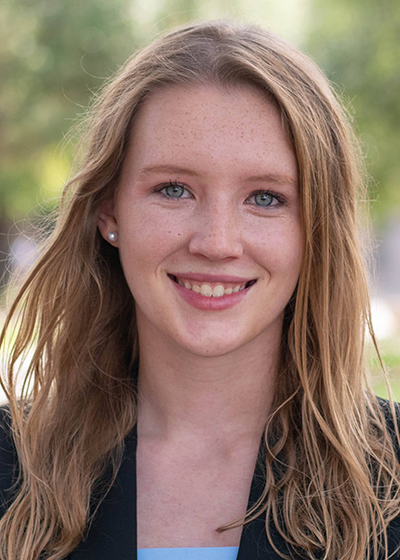
Emily Payne
Major: Mechanical Engineering
Advisor: Astrid Layton
Enhancing the Resilience of Cyber-Physical Power Systems
As cyber-physical power systems grow increasingly complex and interconnected, their resilience to cyber threats, physical failures, and renewable integration challenges is critical to ensuring continuous, reliable energy delivery. My research develops scalable, bio-inspired methodologies to enhance the resilience of these systems by integrating ecological network principles, graph theory, and multi-objective optimization. Inspired by the structure of pollination networks, I identify critical nodes and interdependencies within power grids to mitigate cascading failures and improve operational robustness. My work emphasizes decentralized, low-carbon systems such as microgrids and grid-edge infrastructure, modeling real-world failure scenarios using Python and MATLAB. These models incorporate cybersecurity risk, energy flow dynamics, and system costs to inform resilient system design. In parallel, I contribute to infrastructure policy by integrating artificial intelligence and resilience strategies into critical infrastructure planning, offering actionable insights for national security and energy stakeholders. Ongoing work expands these frameworks to real-time optimization of renewable integration and adaptive CPS architectures. Collectively, my research bridges technical innovation with practical deployment, supporting the secure and sustainable transformation of modern energy infrastructure.
Emily M. Payne is a Ph.D. student in Mechanical Engineering at Texas A&M University, specializing in bio-inspired, resilience-oriented design for cyber-physical systems. Her research spans systems engineering, power grid resilience, and sustainable infrastructure, integrating ecological principles and advanced data analytics to enhance system robustness. Emily is a Walker Impact Fellow, Susan Arseven ‘75 awardee, and Bowen ’58 Fellow, with over 14 scientific publications and multiple national presentations. She has held internships at Pacific Northwest National Laboratory and Jacobs Engineering and is currently serving as President of the Mechanical Engineering Female Graduate Students organization. With a strong foundation in engineering design, coding, and human-centered systems, she is passionate about developing solutions that bridge technical excellence with societal resilience. In her down time she enjoys hiking, baking, crafting, and swimming.
